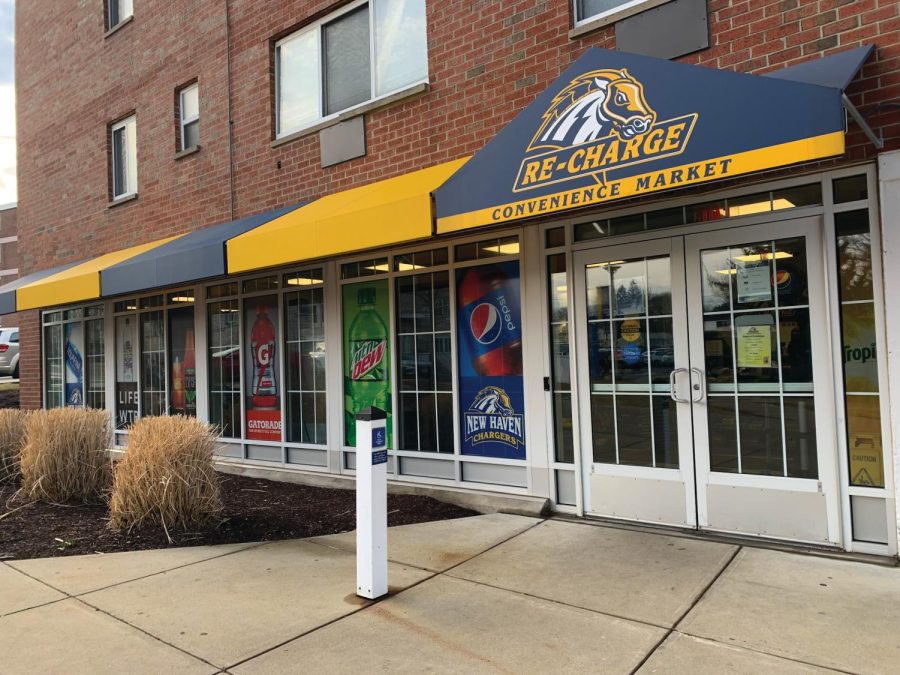Price inflation at the university’s “C-Store”
Outside of the C-Store, West Haven, March 6, 2022.
University of New Haven students, especially those in campus residence, frequently stop at the “C-Store,” connected to Sheffield Hall often for quick access to necessities such as food, drinks and hygiene products. Students can use their dining dollars to finance these purchases, as opposed to spending actual money on these items.
However, the items found at the campus C-Store are priced noticeably higher than standard retail value. Here are some examples:
- A pack of standard Golden Oreos, $5.99 on campus, are sold for just $3.79 at the local Target.
- A can of Bang energy drink, $3.49 at the C-store, is only $1.99 to $2.19 at Target.
- A package of Double Stuf Oreos for $6.49 on campus goes for almost half the price at Target, shelved at just $3.69.
- A standard loaf of Hostess bread cost $4.99 at the C-store, price-matched at just $1.98 at the West Haven Walmart: a 200% price increase.
- A 13 ounce box of Chips Ahoy chocolate chip cookies was charged at $4.49, comparable to a retail value of $3.49 on Target shelves and $2.96 at Walmart.
- A 12-pack of The Original Donut Shop K-Cups, $12.99 at the C-store, in turn are sold in a pack of 24 for $15.99 at Target. This means that instead of weighing out at $0.67, students are paying $1.08 per coffee pod.
Even if these food items are not necessarily considered a necessity, the following are sanitary items held at the same comparison:
- An 8-pack of Tampax Pearl tampons, $5.99 at the C-store, can be compared to a 34-pack of the same item for just $1.50 more at Target.
- A standard bottle of Colgate Total toothpaste, typically, $1.97 at Walmart, is $3.99 at the convenience store.
- 12.5 ounces of Garnier Fructis shampoo, at the exact same scent, is going for $5.99 on campus and $2.82 from Walmart.
For students who do not have private transportation to go off-campus for groceries, or for those who do not have time to do so, the C-Store is heavily relied on for quick necessities.
The school factors dining dollars into each residential meal plan––a value of tangible spending which students have already pre-paid for prior to the start of the semester. Given this, the university theoretically has no need to inflate their prices, as the money they are taking from students is in their possession whether the students actually spend it or not. The value is fixed and paid for prior to its credit being presented to the student body.
Dining dollar values within residential meal plans grant students anywhere from $200 in dining dollars with the Charger Pride plan, to $625 with Charger Blue each semester. For commuters, dining dollar values per semester range from $350 with the Blue Plate plan to $625 with the Green Plate plan.
The C-Store’s manager, Stacy, provided insight on the limitations of being such a small-scale retail unit. They do not have the ability to order items in bulk, which is how larger retail chains gain access to discounted prices. Given that purchasing cost is much higher, the turn around price on the shelves must accommodate such.
She said she felt that this limitation was “good knowledge to have” for students shopping on campus, and wants students to know that “we do the best we can.”

Mia Adduci is a senior studying communication concentrating in multi-platform journalism and media who began writing for the paper her first semester on...






